Federal mediation and conciliation service
Official title: Review of fiscal year 2016 to 2017
On this page
- Executive summary
- 1. Caseload information and activities
- 2. Work stoppage activities
- 3. Significant settlements in 2016 to 2017
- 4. Significant current and forthcoming negotiations in 2017 to 2018
- 5. Appointments under part III of the Canada Labour Code and the Wage Earner
- 6. Grievance arbitration appointments under part I of the Canada Labour Code
- 7. Relationship development program services
- 8. Other key activities
- 9. The industrial relations advisory service
- 10. Appendixes
- Appendix A. FMCS dispute settlement proceeding since 2007 to 2008
- Appendix B. Comparison of settlement stages since 2007 to 2008
- Appendix C. Caseload and work stoppages by industrial sector for fiscal year 2016 to 2017
- Appendix D. Person days lost in the Federal jurisdiction since 2007 to 2008
- Appendix E. Significant settlements achieved in fiscal year 2016 to 2017
- Appendix F. Significant current and forthcoming bargaining situations
- Appendix G. Appointments under part I and III (UD and WR) of the Canada Labour Code and Wage Earners Protection Program Act appointments since 2007 to 2008
Alternate formats
Large print, braille, MP3 (audio), e-text and DAISY formats are available on demand by ordering online or calling 1 800 O-Canada (1-800-622-6232). If you use a teletypewriter (TTY), call 1-800-926-9105.
Executive summary
Federal mediation and conciliation service
The Federal Mediation and Conciliation Service (FMCS) was established to provide dispute resolution and relationship development assistance to trade unions and employers under the jurisdiction of the Canada Labour Code (Code). The Code governs federally regulated employees in key sectors of the economy.
The FMCS offers employers and unionized employees:
- dispute resolution support through the services of conciliation and mediation officers—third parties whose mandate is to assist both parties in reaching a mutual agreement; and
- relationship development services that are intended to prevent disputes before they occur. This is achieved by training workshops on collective bargaining and joint conflict resolution. The FMCS also provides grievance mediation services. These are all ways of resolving disagreements and improving industrial relations during the term of the collective agreement.
The FMCS also plays an important role in another method of conflict resolution: arbitration. It coordinates the appointment of arbitrators, adjudicators and referees to resolve certain types of disputes governed by the Code, such as grievances, unjust dismissal complaints and wage recovery appeals. The FMCS also coordinates appointments under the Wage Earner Protection Program Act (WEPP Act).
In Canada, the use of neutral third parties (conciliation and mediation officers) appointed by the government to resolve labour relation disputes dates back to the Conciliation Act of 1900. The Conciliation Act created the federal Labour Department with a mandate to assist unions and employers in the prevention and resolution of labour disputes.
Over the years, the FMCS and its forerunners have provided employers and unions with professional skills essential to the resolution of their collective bargaining disputes.
Conciliation and mediation: During fiscal year 2016 to 2017, conciliation and mediation officers from the FMCS dealt with 180 collective bargaining disputes under the Code. Ninety-seven percent of the disputes that were settled during the year were resolved without a work stoppage. Just less than one hundredth of one percent (0.01%) of all available work time was lost due to work stoppages during the same period. These negotiations involved companies in most of the industrial sectors covered by Part I of the Code and resulted in major agreements in such industrial sectors as road, air, rail and marine transportation, grain handling, broadcasting and communications.
Maintenance of activities: The Code stipulates that during a strike or lockout, the employer and the employees of the bargaining unit must continue the supply of services, operation of facilities or production of goods to the extent necessary to prevent an immediate and serious danger to the safety or health of the public. The Code sets a process for the negotiation of a “maintenance of activities” agreement and provides a role for the Minister of Labour and the Canada Industrial Relations Board (CIRB) if the parties are unable to reach agreement. In 2016 to 2017, the issue of a “maintenance of activities” agreement was not referred by the Minister to the CIRB under subsection 87.4(5).
Legislation: No special legislation was enacted to end a work stoppage.
Relationship Development Program: During fiscal year 2016 to 2017, the Relationship Development Program (RDP) continued to expand its reach and scope. A total of 252Footnote 1 relationship development interventions were provided during the fiscal year. This is a significant increase from the previous year of 143 interventions. Facilitation services represented the highest number of interventions, while workshop delivery and grievance mediation were also significant contributors. FMCS continued its collaboration with provincial authorities in reaching out to a broader range of stakeholders through the delivery of five public workshops on Labour Relations and the negotiation cycle, garnering over 245 participants from across Canada.
Appointments of neutral third parties – Part I, Part III and the WEPP Act: Arbitrators were appointed in 84 grievance arbitrations in 2016 to 2017 under Part I of the Code. Under Part III of the Code, the FMCS also handled the ministerial appointment of 90 wage recovery referees and 389 unjust dismissal adjudicators and 5 appointments under the Wage Earner Protection Program Act during 2016 to 2017.
Upcoming collective bargaining: Upcoming negotiations during fiscal year 2017 to 2018 will involve, among others, Bell Canada, British Columbia Maritime Employers Association, Canada Post Corporation, Canadian National Railway Company, Canadian Pacific Railway Company, Garda Security Screening Inc., Halifax Employers Association Incorporated and Nav Canada.
1. Caseload information and activities
1.1 Collective bargaining disputes
In 2016 to 2017, the Federal Mediation and Conciliation Service (FMCS) handled 180 collective bargaining disputes. Fifty disputes were carried over as ongoing disputes from previous fiscal years, and conciliation appointments were made in 130 disputes during the fiscal year.
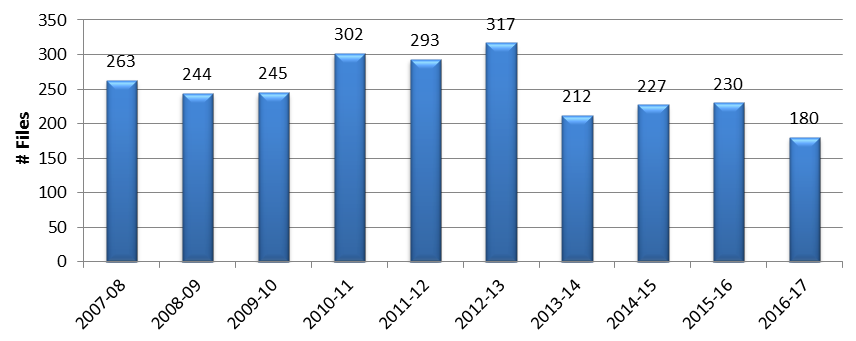
Show data table
| Fiscal year | Total caseload |
|---|---|
| 2007 to 2008 | 263 |
| 2008 to 2009 | 244 |
| 2009 to 2010 | 245 |
| 2010 to 2011 | 302 |
| 2011 to 2012 | 293 |
| 2012 to 2013 | 317 |
| 2013 to 2014 | 212 |
| 2014 to 2015 | 227 |
| 2015 to 2016 | 230 |
| 2016 to 2017 | 180 |
1.2 Post-conciliation appointments
Sixty post-conciliation mediation appointments were made in 2016 to 2017.
1.3 Settled disputes
In 2016 to 2017, of the 180 cases that were handled by the FMCS, 119 disputes were settled. Of these, 43 cases were carried over from previous fiscal years and 76 were new disputes. Ninety-seven percent of all settled disputes were settled without a work stoppage. FMCS has recorded settlement rates of 93 to 97% in the past 10 years.
Total caseload and settlement rates for the last 10 years can be found in Appendix A.
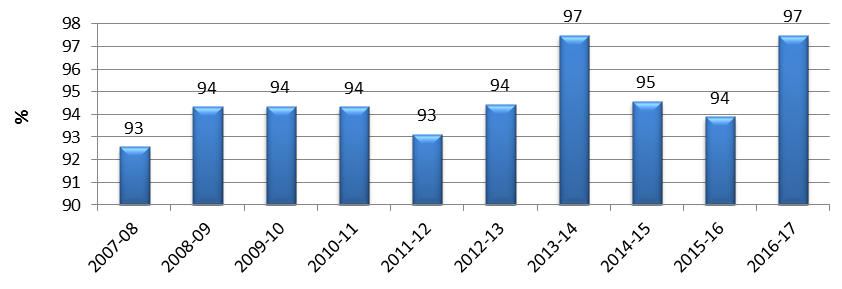
Show data table
| Fiscal year | Percentage of settled disputes without work stoppage |
|---|---|
| 2007 to 2008 | 93 |
| 2008 to 2009 | 94 |
| 2009 to 2010 | 94 |
| 2010 to 2011 | 94 |
| 2011 to 2012 | 93 |
| 2012 to 2013 | 94 |
| 2013 to 2014 | 97 |
| 2014 to 2015 | 95 |
| 2015 to 2016 | 94 |
| 2016 to 2017 | 97 |
1.4 Settlement stage
The majority of settlements continue to be reached at the post conciliation stage of negotiations. During 2016 to 2017, of disputes that were settled during conciliation versus post-conciliation stages, 54% were settled at the post conciliation stage and 46% were settled during conciliation. This trend began after the 1999 revisions to Part I of the Code, which limited the conciliation period to 60 days unless the parties mutually agree to extend it.
See Appendix B for a comparison of settlement stages since 2007 to 2008.
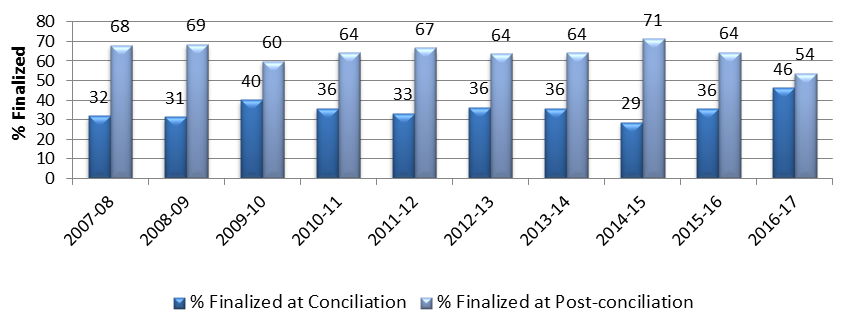
Show data table
| Fiscal year | Percentage finalized at conciliation | Percentage finalized at post-conciliation |
|---|---|---|
| 2007 to 2008 | 32 | 68 |
| 2008 to 2009 | 31 | 69 |
| 2009 to 2010 | 40 | 60 |
| 2010 to 2011 | 36 | 64 |
| 2011 to 2012 | 33 | 67 |
| 2012 to 2013 | 36 | 64 |
| 2013 to 2014 | 36 | 64 |
| 2014 to 2015 | 29 | 71 |
| 2015 to 2016 | 36 | 64 |
| 2016 to 2017 | 46 | 54 |
1.5 Dispute by industry
The largest number of disputes occurred in the road transportation sector (42) followed by the air transportation sector (37). When combined, disputes in the four transportation sectors (air, road, rail and marine) accounted for 59.4% of the total number of disputes handled during the fiscal year.
A breakdown of caseload and work stoppage by industrial sector can be found in Appendix C.
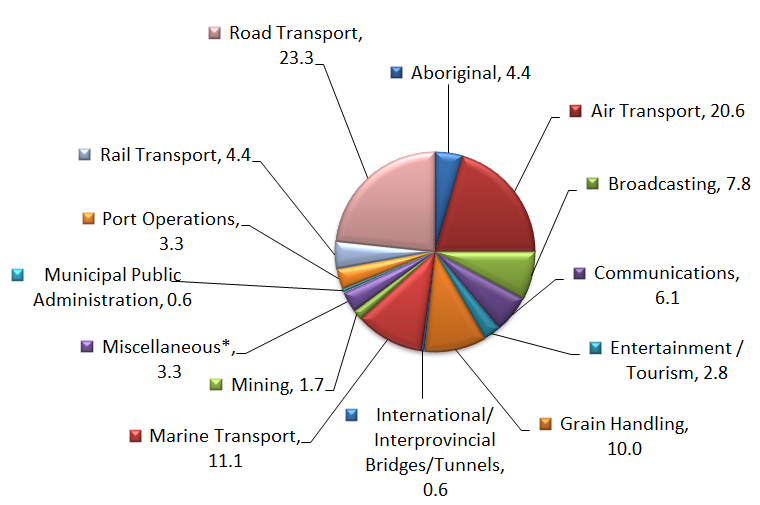
Show data table
| Industrial Sector | Percentage of total caseload |
|---|---|
| Aboriginal | 4.4 |
| Air transport | 20.6 |
| Broadcasting | 7.8 |
| Communications | 6.1 |
| Entertainment/Tourism | 2.8 |
| Grain handling | 10.0 |
| International/Interprovincial Bridges/Tunnels | 0.6 |
| Marine transport | 11.1 |
| Mining | 1.7 |
| Miscellaneous* | 3.3 |
| Municipal public administration | 0.6 |
| Port operations | 3.3 |
| Rail transport | 4.4 |
| Road transport | 23.3 |
| Total all sectors | 100.0 |
| Total transportation | 59.4 |
*Miscellaneous includes: Fishing, education, public utilities, and other service industries (Yukon and Northwest Territories).
2. Work stoppage activities
2.1 Ongoing and initiated work stoppages
Five work stoppages occurred during 2016 to 2017. None were ongoing at the start of the fiscal year and five work stoppages were initiated during the fiscal year. There is one work stoppage ongoing as of April 1, 2017.
There was no ongoing legal work stoppages carried over into 2016 to 2017
| Parties | Bargaining unit | Legal work stoppage | ||
|---|---|---|---|---|
| Began | Ended | Number days | ||
| Old Port of Montreal Corporation and the Public Service Alliance of Canada | 234 permanent, regular and occasional employees | May 27, 2016 | October 27, 2016 | 154 |
| Old Port of Montreal Corporation and the Public Service Alliance of Canada | 16 seasonal employees | May 27, 2016 | November 1, 2016 | 159 |
| Blue Water Bridge (Canada), a division of The Federal Bridge Corporation Limited and the Public Service Alliance of Canada, Local 501 | 48 employees of Blue Water Bridge (Canada), including maintenance and toll collector employees | November 21, 2016 | December 9, 2016 | 19 |
| Société de transport de l’Outaouais and the Amalgamated Transit Union, Local 591 | 602 drivers and maintenance employees | March 16, 2017 - March 21, 2017 - March 30, 2017 | March 16, 2017 - March 21, 2017 - March 30, 2017 | 3 |
| Town of Watson Lake and the Public Service Alliance of Canada | approximately 15 municipal employees of the Town of Watson Lake | March 27, 2017 | Ongoing* | 5 |
*Work stoppage is ongoing at the start of fiscal year 2017 to 2018.
Maximum number of workers: 886
Number of person - Days not worked: 29,940
2.2 Days lost to work stoppages
The five work stoppages accounted for 29,940 person days not worked. The number of working days lost due to work stoppages in 2016 to 2017 represented one hundredth of one percent (0.01%) of the total available work time in the federal private sector.
Appendix D shows work days lost as a percentage of available work time in the federal private sector.
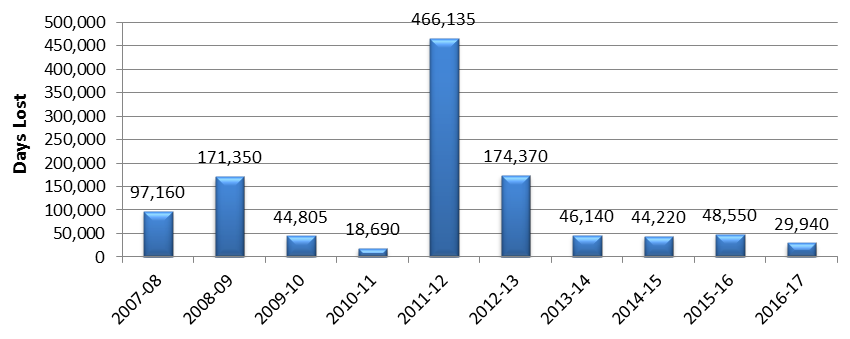
Show data table
| Fiscal year | Days lost |
|---|---|
| 2007 to 2008 | 97,160 |
| 2008 to 2009 | 171,350 |
| 2009 to 2010 | 44,805 |
| 2010 to 2011 | 18,690 |
| 2011 to 2012 | 466,135 |
| 2012 to 2013 | 174,370 |
| 2013 to 2014 | 46,140 |
| 2014 to 2015 | 44,220 |
| 2015 to 2016 | 48,550 |
| 2016 to 2017 | 29,940 |
2.3 Work stoppages by industrial sector
There were two work stoppages in the Entertainment/Tourism sector and one work stoppage in each of the following sectors: road transportation, international/interprovincial bridges/tunnels, and municipal public administration.
Appendix C includes a breakdown of work stoppages by industrial sector.
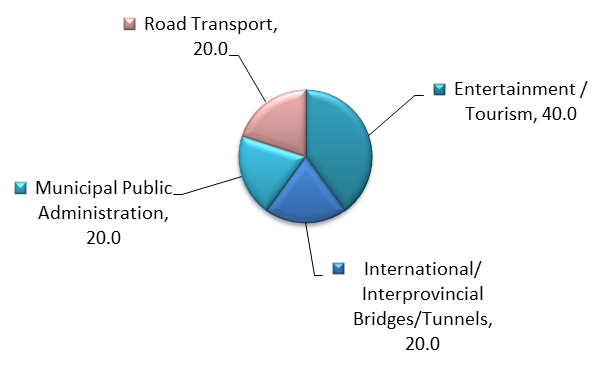
Show data table
| Industrial sector | Percentage of total disputes |
|---|---|
| Entertainment/tourism | 40.0 |
| International/interprovincial Bridges/tunnels | 20.0 |
| Municipal public administration | 20.0 |
| Road transport | 20.0 |
3. Significant settlements in 2016 to 2017
A number of key agreements were renewed across all industrial sectors during fiscal year 2016 to 2017.
A listing of significant settlements achieved in 2016 to 2017 is attached as Appendix E.
4. Significant current and forthcoming negotiations in 2017 to 2018
4.1 Expired and expiring collective agreements
There is an average of 350 collective agreements that expire during a year.
A listing of significant current and forthcoming bargaining situations is attached as Appendix F.
5. Appointments under Part III of the Canada Labour Code and the Wage Earner Protection Program Act
5.1 Appointments: Unjust dismissal, wage recovery and Wage Earner Protection Program
Initial appointments were made under Part III of the Code for 90 wage recovery (WR) appeal cases, 389 unjust dismissal (UD) complaint cases and 5 Wage Earner Protection Program (WEPP) appeal cases. In 2009, the FMCS first handled WEPP appeals after the Wage Earner Protection Program Act provisions came into force in July 2008.
A table showing adjudicator and referee appointment levels since 2007 to 2008 is found in Appendix G.
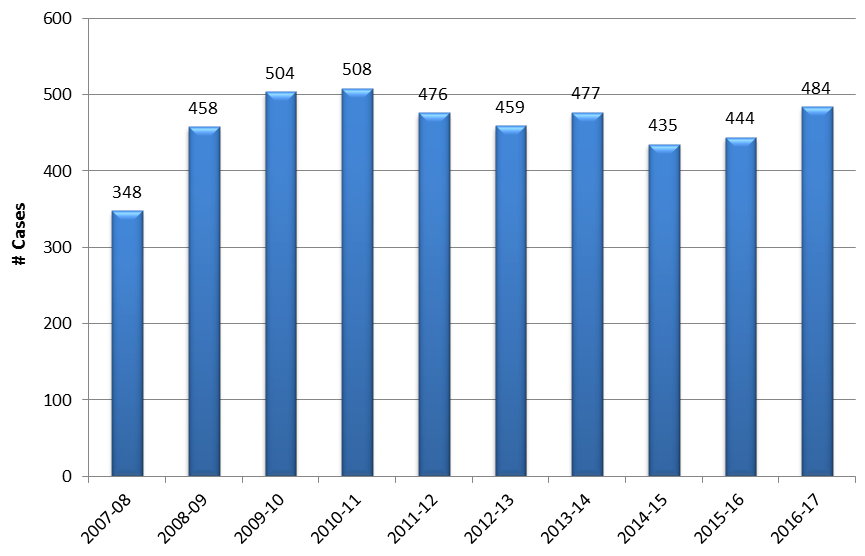
Show data table
| Fiscal year | Total UD, WR and WEPP |
|---|---|
| 2007 to 2008 | 348 |
| 2008 to 2009 | 458 |
| 2009 to 2010 | 504 |
| 2010 to 2011 | 508 |
| 2011 to 2012 | 476 |
| 2012 to 2013 | 459 |
| 2013 to 2014 | 477 |
| 2014 to 2015 | 435 |
| 2015 to 2016 | 444 |
| 2016 to 2017 | 484 |
6. Grievance arbitration appointments under Part I of the Canada Labour Code
6.1 Grievance arbitration appointments
Initial appointments were made under Part I of the Code for 84 grievance arbitration cases during fiscal year 2016 to 2017. These appointments are made when employers and unions are unable to agree upon an arbitrator or arbitration board chairperson to deal with grievances that relate to the application, interpretation, administration or alleged contravention of their respective collective agreements.
Grievance arbitration appointment levels since 2007 to 2008 are included in Appendix G.
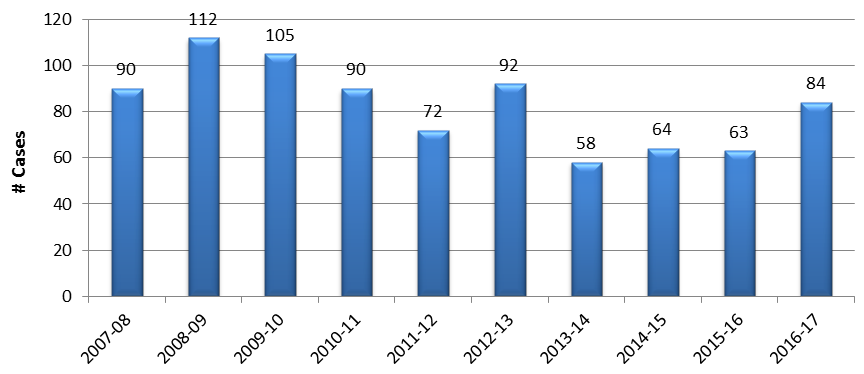
Show data table
| Fiscal year | Part I grievance arbitration appointments |
|---|---|
| 2007 to 2008 | 90 |
| 2008 to 2009 | 112 |
| 2009 to 2010 | 105 |
| 2010 to 2011 | 90 |
| 2011 to 2012 | 72 |
| 2012 to 2013 | 92 |
| 2013 to 2014 | 58 |
| 2014 to 2015 | 64 |
| 2015 to 2016 | 63 |
| 2016 to 2017 | 84 |
7. Relationship development program services
During fiscal year 2016 to 2017, FMCS continued to develop the Relationship Development Program (RDP) by increasing its number of client interventions and reaching out to a broader range of stakeholders. It also continued its collaborative work with provincial jurisdictions through the joint delivery of public workshops. While work is underway to further develop the RDP, mediators continue to offer an array of services to clients across Canada, including:
- public workshops on Labour Relations and the Negotiation Cycle;
- relationship diagnostics;
- customized training workshops;
- facilitation of committee meetings;
- facilitation of direct negotiations; and
- grievance mediation.
A total of 252 relationship development interventions were made in 2016 to 2017. The year was also marked by the delivery of five public workshops on Labour Relations and the Negotiation Cycle in collaboration with provincial authorities, garnering over 245 participants from across Canada, both from federally and provincially-regulated sectors. FMCS also offered a number of joint customized training workshops and helped facilitate various workplace issues, thus contributing to long-term stability among unions and employers.
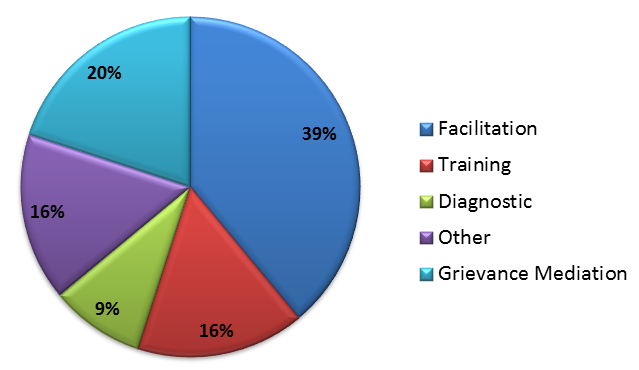
Show data table
| Service | Percentile of interventions |
|---|---|
| Facilitation | 39% |
| Training | 16% |
| Diagnostic | 9% |
| Other | 16% |
| Grievance Mediation | 20% |
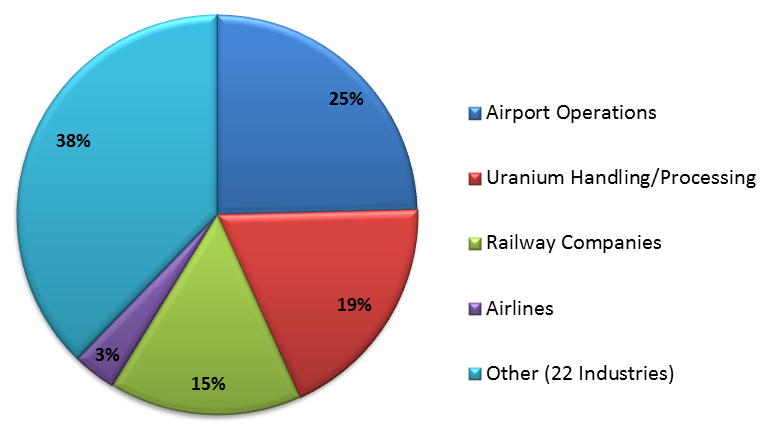
Show data table
| Industry | Percentage of interventions |
|---|---|
| Airport operations | 25% |
| Uranium handling/Processing | 19% |
| Railway companies | 15% |
| Airlines | 4% |
| Other (22 Industries) | 38% |
The largest number of relationship development services were provided to clients involved with Airport Operations (25%), followed by Uranium Handling/Processing (19%) and Railway Companies (15%). The “Other” category (38%) includes 22 other industries under the federal jurisdiction.
8. Other key activities
8.1 Status of the Artist Act activities
FMCS handled one request, which was carried forward from the two previous fiscal years, for mediation assistance under Part II – Professional Relations, section 45 of the Status of the Artist Act. The parties involved are Groupe Media TFO and l’Union des Artistes.
8.2 Ministerial referrals to the Canada Industrial Relations Board under subsection 87.4(5) of the Canada Labour Code – Maintenance of activities agreement
The Code stipulates that during a strike or lockout, the employer and the employees of the bargaining unit must continue the supply of services, operation of facilities or production of goods to the extent necessary to prevent an immediate and serious danger to the safety or health of the public. The Code sets out a process for the negotiation of a “maintenance of activities” agreement and provides a role for the Minister of Labour and the Canada Industrial Relations Board if the parties are unable to reach agreement.
In 2016 to 2017, no referral was made out of approximately 18 strike or lockout notices received.
8.3 Back to work Legislation
In some exceptional circumstances, where there has been a high profile work stoppage ongoing for some time, the Minister may decide to intervene in a dispute by tabling legislation. This step is taken when there is a high level of public pressure on the government to terminate a dispute that is affecting the public interest or the economy. In 2016 to 2017, back-to-work legislation was not enacted to end a strike or lockout.
9. The industrial relations advisory service
Industrial Relations Advisory Service (IRAS) carries out a variety of activities intended to ensure the maintenance of an appropriate framework for collective bargaining in the federal jurisdiction. This area has the responsibility for coordinating any legislative initiatives undertaken by the FMCS, including amendments to existing industrial relations legislation, and analyzes labour board and court decisions, government initiatives and representations by client groups to assess their implications for labour relations. Through its research, liaison and advisory activities, IRAS contributes to the overall FMCS mandate for dispute settlement and prevention. Research is conducted into current and emerging industrial relations problems and issues in order to develop strategies and initiatives that will support labour relations in the federal jurisdiction.
9.1 Technical expertise for interdepartmental committees
IRAS provides industrial relations expertise for inter-departmental committees dealing with policy initiatives having implications for labour-management relations or government labour policies. Specific activities include:
- presentation of departmental positions;
- provision of an understanding of the government’s labour relations philosophy;
- discussion and decisions which take account of legislative requirements, as well as acquired rights of both labour and management; and
- provision of information and data on specific industrial relations situations.
9.2 Coordinator of legislative initiatives
FMCS Program involvement in the legislative area can be ad hoc (for example emergency back-to-work legislation). IRAS is responsible for providing the Minister with the support and briefing material required for Cabinet deliberations and parliamentary consideration of Bills. Activities include:
- preparation of a Memorandum to Cabinet;
- instruction of Department of Justice drafters;
- preparation of Minister’s speech and briefing material; and
- implementation of the Act, once proclaimed.
9.3 Specialized research in support of dispute resolution initiatives
Operational research expertise is provided to conciliators and mediators, conciliation commissioners, industrial inquiry commissions, and other dispute resolution specialists on industrial relations and economic issues. This direct support is provided both in relation to specific needs arising out of ongoing dispute resolution or preventive mediation initiatives and, as well, on a continuing basis. Specific activities include:
- analysis of employer/union positions on key issues in dispute and the prevailing industry practices; and
- preparation of major industry bargaining histories which detail, over a time period, the bargaining relationship, the extent and nature of third party assistance, changes in key issues and terms of settlement and any other significant economic or industrial relations variables.
9.4 Briefings for ministerial use
IRAS prepares, on a regular basis, briefing notes to support the Minister in the management of high profile labour disputes and to support the Minister when meeting with stakeholders.
10. Appendixes
| Caseload | Settled | Settlements without work stoppages | ||||||
|---|---|---|---|---|---|---|---|---|
| Fiscal year | Carried forward | New s.72 Appts | Total caseload | Carried over | New s.72 Appts | Total cases settled | Cases | Percentage |
| 2007 to 2008 | 83 | 180 | 263 | 61 | 114 | 175 | 162 | 93% |
| 2008 to 2009 | 89 | 155 | 244 | 58 | 101 | 159 | 150 | 94% |
| 2009 to 2010 | 83 | 162 | 245 | 46 | 96 | 142 | 134 | 94% |
| 2010 to 2011 | 87 | 215 | 302 | 60 | 99 | 159 | 150 | 94% |
| 2011 to 2012 | 104 | 189 | 293 | 88 | 101 | 189 | 176 | 93% |
| 2012 to 2013 | 89 | 228 | 317 | 69 | 165 | 234 | 221 | 94% |
| 2013 to 2014 | 77 | 135 | 212 | 62 | 97 | 159 | 155 | 97% |
| 2014 to 2015 | 53 | 174 | 227 | 42 | 87 | 129 | 122 | 95% |
| 2015 to 2016 | 98 | 132 | 230 | 93 | 87 | 180 | 169 | 94% |
| 2016 to 2017 | 50 | 130 | 180 | 43 | 76 | 119 | 116 | 97% |
| Fiscal year | Total cases finalized | Total settled at conciliation stage | Percentage finalized at conciliation | Total settled at post-conciliation stage | Percentage finalized at post-conciliation |
|---|---|---|---|---|---|
| 2007 to 2008 | 175 | 56 | 32% | 119 | 68% |
| 2008 to 2009 | 159 | 50 | 31% | 109 | 69% |
| 2009 to 2010 | 142 | 57 | 40% | 85 | 60% |
| 2010 to 2011 | 159 | 57 | 36% | 102 | 64% |
| 2011 to 2012 | 189 | 63 | 33% | 126 | 67% |
| 2012 to 2013 | 234 | 85 | 36% | 149 | 64% |
| 2013 to 2014 | 159 | 57 | 36% | 102 | 64% |
| 2014 to 2015 | 129 | 37 | 29% | 92 | 71% |
| 2015 to 2016 | 180 | 64 | 36% | 116 | 64% |
| 2016 to 2017 | 119 | 55 | 46% | 64 | 54% |
| Industrial sector | Total caseload | Percentage of total caseload | Number of disputes with work stoppages | Percentage of total disputes |
|---|---|---|---|---|
| Aboriginal | 8 | 4.4% | 0 | 0% |
| Air transport | 37 | 20.6% | 0 | 0% |
| Broadcasting | 14 | 7.8% | 0 | 0% |
| Communications | 11 | 6.1% | 0 | 0% |
| Entertainment/Tourism | 5 | 2.8% | 2 | 40% |
| Grain handling | 18 | 10.0% | 0 | 0% |
| International/Interprovincial Bridges/Tunnels | 1 | 0.6% | 1 | 20% |
| Marine transport | 20 | 11.1% | 0 | 0% |
| Mining | 3 | 1.7% | 0 | 0% |
| Miscellaneous | 6 | 3.3% | 0 | 0% |
| Municipal public administration | 1 | 0.6% | 1 | 20% |
| Port operations | 6 | 3.3% | 0 | 0% |
| Rail transport | 8 | 4.4% | 0 | 0% |
| Road transport | 42 | 23.3% | 1 | 20% |
| Total all sectors | 180 | 100% | 5 | 100% |
| Total transportation | 107 | 59.4% | 1 | 20% |
| Fiscal year | Number of work stoppages | Days lost | As a percentage of all available time in federal jurisdiction |
|---|---|---|---|
| 2007 to 2008 | 16 | 97,160 | 0.05% |
| 2008 to 2009 | 8 | 171,350 | 0.08% |
| 2009 to 2010 | 6 | 44,805 | 0.02% |
| 2010 to 2011 | 9 | 18,690 | 0.01% |
| 2011 to 2012 | 13 | 466,135 | 0.22% |
| 2012 to 2013 | 17 | 174,370 | 0.08% |
| 2013 to 2014 | 5 | 46,140 | 0.02% |
| 2014 to 2015 | 11 | 44,220 | 0.02% |
| 2015 to 2016 | 8 | 48,550 | 0.02% |
| 2016 to 2017 | 5 | 29,940 | 0.01% |
| Employer and union | Bargaining unit |
|---|---|
| 1791949 Ontario Ltd., c.o.b. as Toronto Ground Airport Services, Mississauga, Ontario, and the International Association of Machinists and Aerospace Workers, Transportation District 140 (Lester B. Pearson International Airport) |
|
| Aeroplan Canada Inc., Montréal, Quebec, and Unifor Local 2002 |
|
| Aéroport de Québec Inc., Québec, Quebec, and the Public Service Alliance of Canada |
|
| Air Transat A.T., Montréal, Quebec, and the Canadian Union of Public Employees |
|
| Airport Terminal Services Canadian Company, Richmond, British Columbia, and the International Association of Machinists and Aerospace Workers (Vancouver International Airport) |
|
| ASIG Canada Ltd., Brampton, Ontario, and Teamsters Local Union No. 938 (Lester B. Pearson International Airport) |
|
| Atlantic Pilotage Authority, Halifax, Nova Scotia, and the Canadian Merchant Service Guild |
|
| Bell Canada, Montréal, Quebec, and Unifor |
|
| Blue Water Bridge (Canada), a division of The Federal Bridge Corporation Limited, Point Edward, Ontario, and the Public Service Alliance of Canada Local 501 |
|
| Bradley Air Services Limited, carrying on Business as First Air, Kanata, Ontario, and Unifor Local 2002 |
|
| Canada Post Corporation, Ottawa, Ontario, and the Canadian Union of Postal Workers |
|
| CanJet Airlines, a division of I.M.P. Group Limited, Enfield, Nova Scotia, and the Canadian Union of Public Employees Local 4044 |
|
| CEVA Logistics Canada ULC, Oshawa, Ontario, and Unifor Local 222 |
|
| Central Maine & Québec Railway Canada Inc., Montréal, Quebec, and TC Local 1976, United Steelworkers |
|
| Cogeco Câble Quebec general partnership, Trois-Rivières, Quebec, and the Canadian Union of Public Employees Local 3624 |
|
| DHL Express (Canada) Ltd., Brampton, Ontario, and Unifor Locals 114, 755, 4005, 4050 and 4457 (employees in Alberta, British Columbia, Manitoba, Nova Scotia and Ontario) |
|
| First Student Canada, Thunder Bay, Ontario, and the United Steelworkers of America Local 5481 |
|
| FirstCanada ULC, carrying on business as First Student Canada, Markham, Ontario, and Unifor Local 4268 |
|
| GardaWorld Cash Solutions, Calgary, Alberta, and Teamsters Local 927 (employees in New Brunswick and Prince Edward Island) |
|
| Greater Toronto Airports Authority, Toronto, Ontario, and the Pearson Airport Professional Fire Fighters Association Local 4382 |
|
| Garda Security Group G.P., Montréal, Quebec, and the Syndicat des agent-es de sécurité de ADM-CSN (Montréal-Pierre Elliott Trudeau International Airport) |
|
| Nova Scotia Division of the Canadian Corps of Commissionaires and the Public Service Alliance of Canada (Halifax International Airport) |
|
| Prince Rupert Grain Ltd., Prince Rupert, British Columbia, and the Grain Workers Union Local 333 ILWU Canada |
|
| Saskatchewan Telecommunications, Regina, Saskatchewan, and Unifor |
|
| Seaspan ULC, North Vancouver, British Columbia, and the Canadian Merchant Service Guild |
|
| Seaspan ULC, North Vancouver, British Columbia, and the International Longshore and Warehouse Union Local 400 |
|
| Old Port of Montréal Corporation Inc., Montréal, Quebec, and the Public Service Alliance of Canada |
|
| Sunwing Airlines Inc., Toronto, Ontario, and the Canadian Union of Public Employees Local 4055 |
|
| Sunwing Airlines Inc., Toronto, Ontario, and Unifor Local 7378 |
|
| Swissport Canada Fuel Services Inc., Montréal, Quebec, and the International Association of Machinists and Aerospace Workers (Dorval-Trudeau and Mirabel Airports) |
|
| Swissport Canada Handling Inc., Richmond, British Columbia, and the International Association of Machinists and Aerospace Workers (Vancouver International Airport) |
|
| Swissport Canada Inc., Calgary, Alberta, and the International Association of Machinists and Aerospace Workers, Transportation District Lodge 140, Local Lodge 2734 (Calgary International Airport) |
|
| Toronto Port Authority, Toronto, Ontario, and the International Longshoremen’s Association Local 1842 |
|
| Toronto Terminals Railway, Toronto, Ontario, and the International Brotherhood of Electrical Workers, System Council No. 11 |
|
| Toronto Terminals Railway, Toronto, Ontario, and Unifor |
|
| Vancouver International Airport Authority, Richmond, British Columbia, and the Public Service Alliance of Canada |
|
| Vancouver Terminal Elevator Association, Vancouver, British Columbia, and the Grain Workers Union Local 333 ILWU Canada |
|
| VIA Rail Canada Inc., Montréal, Quebec, and Unifor |
|
| Viterra Inc., Regina, Saskatchewan, and the Grain and General Services Union (ILWU – Canada) |
|
| Westshore Terminals Limited Partnership, Delta, British Columbia, and the International Longshore and Warehouse Union Local 502 (Port of Roberts Bank) |
|
| Collective agreement expiry date | Employer and union | Bargaining unit |
|---|---|---|
| July 22, 2016 | Canadian National Railway Company, Montréal, Quebec, and Teamsters Canada Rail Conference |
|
| December 10, 2016 | Consolidated Aviation Fueling of Toronto Ltd., Toronto, Ontario, and the International Association of Machinists and Aerospace Workers |
|
| December 31, 2016 | Canadian National Railway Company, Montréal, Quebec, and the International Brotherhood of Electrical Workers, System Council No. 11 |
|
| December 31, 2016 | Marine Atlantic Inc., North Sydney, Nova Scotia, and Unifor |
|
| December 31, 2016 | Marine Atlantic Inc., St. John’s, Newfoundland and Labrador, and the Canadian Merchant Service Guild |
|
| December 31, 2016 | NAV Canada, Ottawa, Ontario, and the Public Service Alliance of Canada |
|
| December 31, 2016 | Vancouver Terminal Elevator Association, Vancouver, British Columbia, and the Grain Workers Union Local 333 ILWU Canada |
|
| January 13, 2017 | Jazz Air Limited Partnership, Richmond, British Colombia (and Quebec City based employees), and Unifor |
|
| January 31, 2017 | Canadian North Inc., Calgary, Alberta, and the Air Line Pilots Association, International |
|
| January 31, 2017 | Lakehead Terminal Elevators Association, Thunder Bay, Ontario, and the United Steel, Paper and Forestry, Rubber, Manufacturing, Energy, Allied Industrial and Service Workers International Union Local 1976, Unit Lodge 650 (United Steelworkers) |
|
| January 31, 2017 | Yukon Hospital Corporation, Yukon Territory, and the Professional Institute of the Public Service of Canada |
|
| March 31, 2017 | Aéroports de Montréal, Dorval, Quebec, and the Syndicat des employé-e-s des Aéroports de Montréal (CSD) |
|
| March 31, 2017 | Atomic Energy of Canada Limited (Chalk River Laboratories), Chalk River, Ontario, and the United Steel, Paper and Forestry, Rubber Manufacturing, Energy, Allied-Industrial and Service Workers International Union (United Steelworkers) |
|
| March 31, 2017 | Canadian National Railway Company, Montréal, Quebec, and Unifor |
|
| March 31, 2017 | Desgagnés Marine Cargo Inc., Québec, Quebec, and the Canadian Merchant Service Guild |
|
| March 31, 2017 | Desgagnés Marine Cargo Inc., Québec, Quebec, and the Seafarers’ International Union of Canada |
|
| March 31, 2017 | Garda Security Screening Inc., Toronto, Ontario, and Teamsters Local 847 (London International Airport) |
|
| March 31, 2017 | Great Lakes Pilotage Authority, Corwall, Ontario, and the Corporation of the Upper St. Lawrence Pilots and the Canadian Merchant Service Guild |
|
| March 31, 2017 | NAV Canada, Ottawa, Ontario, the Canadian Air Traffic Control Association, Unifor Local 5454 |
|
| March 31, 2017 | Ornge Air, Mississauga, Ontario, and the Office and Professional Employees International Union |
|
| March 31, 2017 | Pacific Pilotage Authority, Vancouver, British Columbia, and the International Longshore and Warehouse Union Local 520 |
|
| April 1, 2017 | Garda Security Screening Inc., Thunder Bay, Ontario, and the United Food and Commercial Workers Canada Local 175 (Thunder Bay International Airport) |
|
| April 30, 2017 | NAV Canada, Cornwall, Ontario, and the Canadian Federal Pilots Association |
|
| April 30 2017 | NAV Canada, Ottawa, Ontario, and the Professional Institute of the Public Service of Canada |
|
| April 30, 2017 | NAV Canada, Ottawa, Ontario, and Unifor |
|
| May 2, 2017 | PLH Aviation Services Inc., Edmonton, Alberta, and Teamsters Local 362 |
|
| June 30, 2017 | National Gallery of Canada, Ottawa, Ontario, and the Public Service Alliance of Canada |
|
| June 30, 2017 | NAV Canada, Ottawa, Ontario, and Unifor |
|
| September 7, 2017 | Swissport Canada Handling Inc., Richmond, British Columbia, and Unifor (Vancouver International Airport) |
|
| September 30, 2017 | CAFAS Fueling ULC, Montréal, Quebec, and the International Association of Machinists and Aérospace Workers, District 140, Local Lodge 2301 (Montréal-Pierre Elliott Trudeau International Airport) |
|
| September 30, 2017 | Canadian Nuclear Laboratories (formerly Atomic Energy of Canada Limited), Chalk River, Ontario, and the Canadian Union of Public Employees |
|
| October 31, 2017 | Canpar Transport L.P., Brampton, Ontario, and Teamsters Canada Local 1976 USW |
|
| November 30, 2017 | Bell Canada, Montréal, Quebec, and Unifor |
|
| November 30, 2017 | Quebec Ports Terminals Inc., Rivière-du-Loup, Quebec, and the International Longshoremen’s Association Local 2033 |
|
| December 31, 2017 | Bell Aliant Regional Communications, Limited Partnership, and Unifor Atlantic Communication Locals (Unifor ACL) (employees in Nova Scotia, New Brunswick, Newfoundland and Labrador and Prince Edward Island) |
|
| December 31, 2017 | Canada Post Corporation, Ottawa, Ontario, and the Canadian Union of Postal Workers |
|
| December 31, 2017 | Canadian National Railway Company, Montréal, Quebec, and Teamsters Canada Rail Conference |
|
| December 31, 2017 | Canadian Pacific Railway Company, and Teamsters Canada Rail Conference Maintenance of Way Employees Division |
|
| December 31, 2017 | Canadian Pacific Railway Company, and the Canadian Signals and Communications System Council No. 11 of the International Brotherhood of Electrical Workers |
|
| December 31, 2017 | Halifax Employers Association Incorporated, Halifax, Nova Scotia, and the Council of ILA Locals for the Port of Halifax |
|
| December 31, 2017 | Halifax Employers Association Incorporated, Halifax, Nova Scotia, and the Council of ILA Locals for the Port of Halifax |
|
| December 31, 2017 | Halifax Employers Association Incorporated, Halifax, Nova Scotia, and the Council of ILA Locals for the Port of Halifax |
|
| December 31, 2017 | Laurentian Bank of Canada and Laurentian Trust of Canada, Montréal, Quebec, and the Syndicat des employées et employés professionnels-les et de bureau, section locale 434 |
|
| December 31, 2017 | Maritime Employers Association, Hamilton, Ontario, and the International Longshoremen’s Association |
|
| December 31, 2017 | Quebec Ports Terminals Inc., La Baie, Quebec, and Unifor Local 2004-Q, unit T.P.Q. (Port of Grande-Anse) |
|
| January 31, 2018 | Canada Post Corporation, Ottawa, Ontario, and the Canadian Union of Postal Workers |
|
| January 31, 2018 | Garda Canada Security Corporation, Mississauga, Ontario, and the International Association of Machinists and Aerospace Workers (Lester B. Pearson International, Buttonville and Toronto City Centre Airports) |
|
| January 31, 2018 | GardaWorld Cash Services Canada Corporation, Vancouver, British Columbia, and Unifor |
|
| February 25, 2018 | Swissport Canada Handling Inc., Saint-Laurent, Quebec, and the Canada Council of Teamsters (International Airports in Dorval and Mirabel) |
|
| Februray 28, 2018 | Quebec North Shore and Labrador Railway Company Inc., Sept-Îles, Quebec, and the United Steel, Paper and Forestry, Rubber, Manufacturing, Energy, Allied Industrial and Service Workers International Union (United Steelworkers), Local 9344 |
|
| March 31, 2018 | British Columbia Maritime Employers Association, Vancouver, British Columbia, and the International Longshore and Warehouse Union – Canada |
|
| March 31, 2018 | British Columbia Maritime Employers Association, Vancouver, British Columbia, and the International Longshore and Warehouse Union – Canada Local 514 |
|
| March 31, 2018 | Canada Post Corporation, Ottawa, Ontario, and the Association of Postal Officials of Canada |
|
| March 31, 2018 | Canadian National Railway Company, Montréal, Quebec, and Unifor |
|
| March 31, 2018 | G4S Secure Solutions (Canada) Ltd., Vancouver, British Columbia, and the International Association of Machinists and Aerospace Workers, Transportation District 140, Local Lodge 16 (Vancouver International Airport) |
|
| March 31, 2018 | Garda Security Screening Inc., Calgary, Alberta, and General Teamsters Local 362 (Calgary International Airport) |
|
| March 31, 2018 | Garda Security Screening Inc., Edmonton, Alberta, and General Teamsters Local 362 (Edmonton International Airport) |
|
| March 31, 2018 | Garda Security Screening Inc., Ottawa, Ontario, and the United Steel, Paper and Forestry, Rubber, Manufacturing, Energy, Allied Industrial and Service Workers International Union (United Steelworkers) (Macdonald-Cartier International Airport) |
|
| March 31, 2018 | Garda Security Screening Inc., Toronto, Ontario, and the United Steel, Paper and Forestry, Rubber, Manufacturing, Energy, Allied Industrial and Service Workers International Union (United Steelworkers) (Sarnia Chris Hadfield Airport) |
|
| March 31, 2018 | Garda Security Screening Inc., Winnipeg, Manitoba, and General Teamsters Local 979 (Winnipeg International Airport) |
|
| October 31, 2018 | Richardson International Limited, Regina, Saskatchewan, and the Grain and General Services Union (International Longshore & Warehouse Union Canada) |
|
| December 31, 2018 | Maritime Employers Association, Montréal, Quebec, and the Longshoremen’s Association, Local 1375 of the Canadian Union of Public Employees |
|
| Fiscal year | Part III UD appointments | Part III WR appointments | WEPP appointments* | Total UD, WR and WEPP | Part I Grievance arbitration appointments |
|---|---|---|---|---|---|
| 2007 to 2008 | 221 | 127 | n/a | 348 | 90 |
| 2008 to 2009 | 318 | 140 | n/a | 458 | 112 |
| 2009 to 2010 | 364 | 136 | 4 | 504 | 105 |
| 2010 to 2011 | 386 | 121 | 1 | 508 | 90 |
| 2011 to 2012 | 305 | 170 | 1 | 476 | 72 |
| 2012 to 2013 | 315 | 142 | 2 | 459 | 92 |
| 2013 to 2014 | 334 | 135 | 8 | 477 | 58 |
| 2014 to 2015 | 297 | 130 | 8 | 435 | 64 |
| 2015 to 2016 | 355 | 81 | 8 | 444 | 63 |
| 2016 to 2017 | 389 | 90 | 5 | 484 | 84 |
* WEPP provisions came into force in July 2008.
